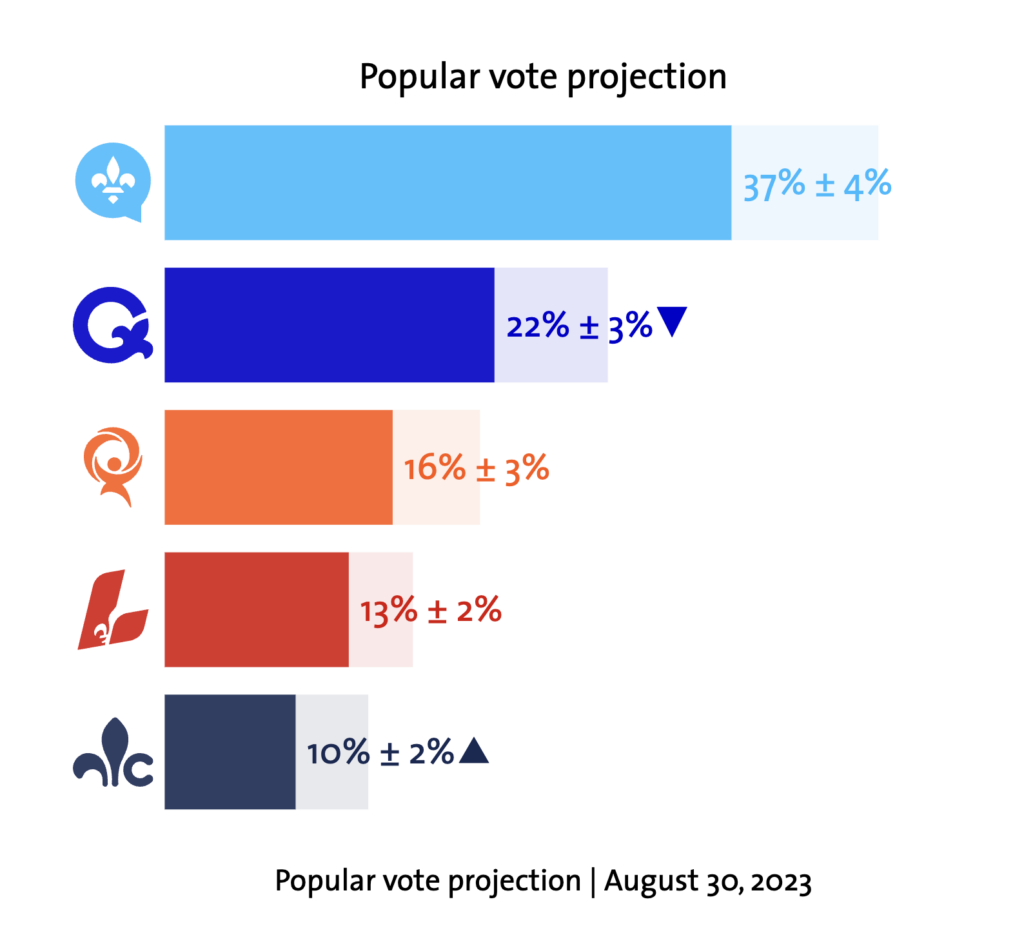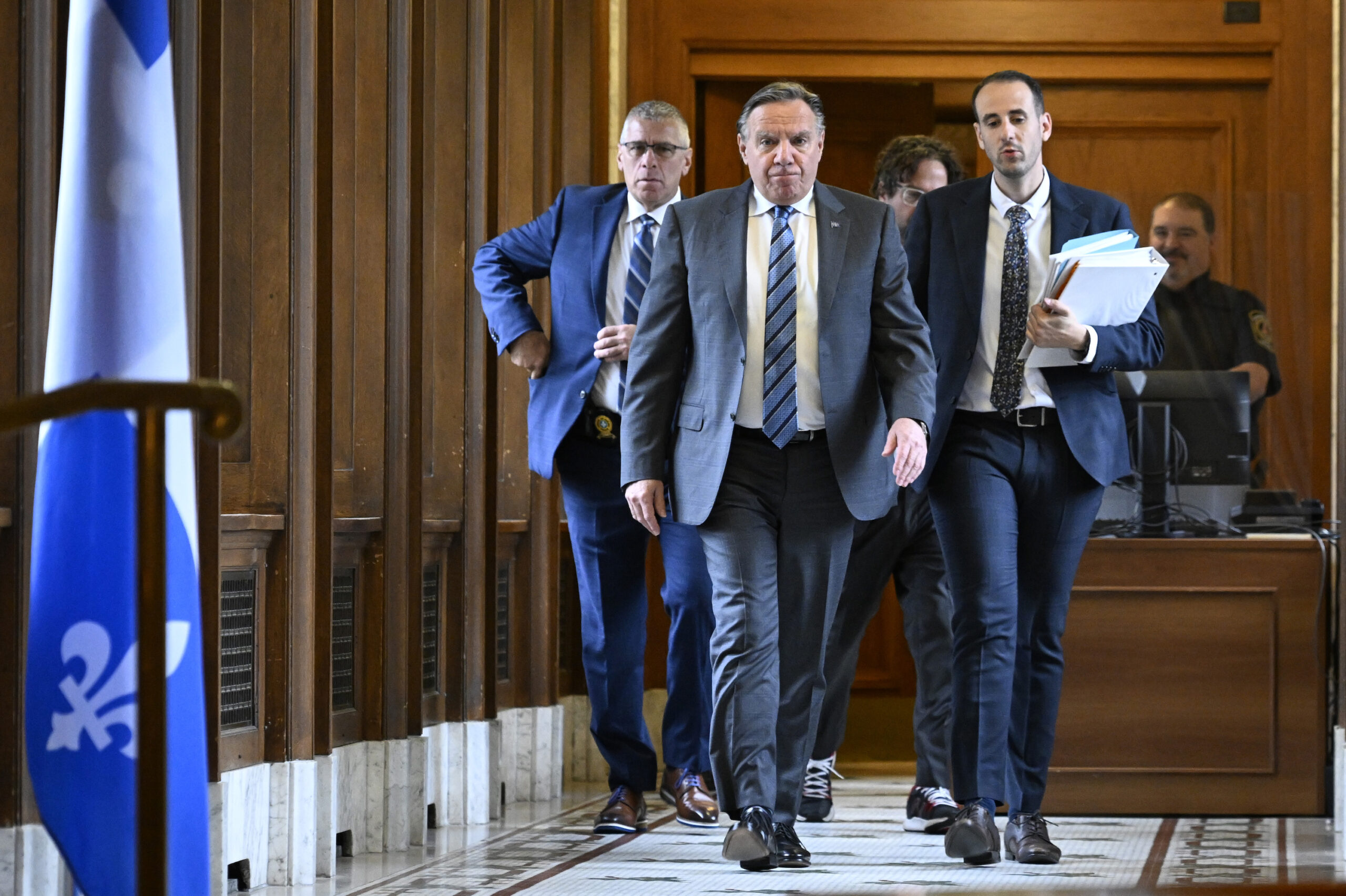The Quebec National Assembly resumes this week after a record-breaking wildfire season, prompting multi-jurisdictional emergency response initiatives and dominating national news cycles. In the weeks ahead, priorities of the government will focus on health care reform with the newly created Santé Québec and the introduction of new legislation on energy transition to attain a carbon neutral economy.
The legislature will sit for eleven weeks, with the session ending on November 23.
The CAQ begins its second year of its second term with new polling showing satisfaction in the government declining. Premier François Legault’s team is facing many challenges, including inflation, affordability and mayors calling on the government to provide more funding for multiple needs including housing and negotiations with public sector unions. In response, the premier has said there is limited money to give out, and funding will be targeted toward housing, homelessness and climate change in the coming months. Finance Minister Eric Girard also stated the government won’t be cutting taxes or handing out “anti-inflation” cheques.
Elections/leadership races
Unfolding in the background of the session is the Quebec Liberal Party’s leadership race, following the news that interim leader Marc Tanguay renounced his bid for party leadership. The party has been without a permanent leader since Dominique Anglade’s departure in December 2022.
With CAQ MNA Joëlle Boutin’s resignation, the by-election in the riding of Jean-Talon (Quebec City) on October 2 will be a test for both the QLP and the CAQ following Premier Legault’s increased dissatisfaction in the region since his decision to drop plans to build an automobile tunnel under the St. Lawrence River between Quebec City and Lévis. Prior to Boutin’s election, the riding had always been Liberal, but a poll from Leger is currently pointing towards a close fight between the CAQ and the PQ candidates.
In November, Québec Solidaire members will elect a new co-spokesperson, alongside Gabriel Nadeau-Dubois, to replace Manon Massé, who will continue to sit as a member of MNA. Candidates include Christine Labrie, Ruba Ghazal and Émilise Lessard-Therrien.
Health care
There is increasing pressure from the Minister of Health and Social Services Christian Dubé to pass Bill 15, his ambitious healthcare reform legislation, by the end of the year. To date, 150 amendments have been made, with more changes expected to come in mid-September. Interim Quebec Liberal Party leader Marc Tanguay has expressed concerns that the government would pass its legislation under a gag order, an option that Dubé has not ruled out, stating discussions would have to stop at some point. Meanwhile, 500 members of the Fédération interprofessionnelle de la santé (FIQ), an 80,000 member health care workers union that includes Quebec’s nurses, took part in a demonstration in Laval and Montreal to protest their lack of progress in contract negotiations with the Legault government. The union has been without a contract since March 31st.
Environment/energy
Following up on the CAQ’s promise to cut greenhouse gases by 37 per cent of 1990 levels by 2030 and for the province to have net-zero emissions by 2050, the development of the Quebec battery industry will carry on. The biggest private investment in the history of Quebec will be announced by the end of September with the arrival of the Northvolt battery plant.
The expansion and management of the green energy transition continues to be a major theme in Quebec, with CAQ members voting in favour of building more hydroelectric dams during their convention and Premier Legault stating the province would need to build four to five new dams in the next twenty years to meet growing demand for electricity. Minister of Economy, Innovation and Energy Pierre Fitzgibbon also spoke on other forms of green energy, mentioning windfarms, solar and new turbines, while specifying that dams would be important if energy was missing. Alongside the new CEO of Hydro-Quebec, Michael Sabia, Minister Fitzgibbon has also suggested that the province will explore the feasibility of re-deploying nuclear energy.
Minister Fitzgibbon is set to introduce a new bill regarding Hydro-Quebec and the Regie de l’Energie (clean energy), as well as others regarding windmill acceleration, revision of electricity costs for businesses and residential homes.
Immigration/French language
French language has been top of mind for the CAQ government and is expected to persist throughout this legislative session. Last week, Quebec announced it would be appealing a Superior Court ruling declaring sections of Bill 40 abolishing English school boards invalid. Minister of the French Language Jean-François Roberge will also table a new “action plan” in the fall to reverse the decline of French, particularly in Montreal.
In an effort to promote the French language, the government announced they will be injecting $1.5 million into promoting the language in Montreal over the next three years. The money will be used towards learning activities and a program for new immigrants to learn French. A public consultation on immigration is also set to start on September 15 to determine the new immigration threshold for the province. Quebec wants the economic category of immigration to demonstrate an intermediate knowledge of French in order to be admitted.
Education
Minister of Education Bernard Drainville has to pass his reform which will give him more power, such as naming and general directors of school service centres and support their decisions or impose his. Minister Drainville said he intends to introduce legislation this fall following the report on sexual misconduct in schools in Quebec that showed ‘widespread’ weaknesses in handling cases. Québec Solidaire’s education critic, Ruba Ghazal, offered Drainville her full co-operation if he wants to fast-track changes.
Other items
- Housing will continue to be a hot topic. Minister of Housing France-Élaine Duranceau has indicated interest in working with the Federal government to find solutions to the crisis in Nunavik. Finance Minister Eric Girard will present an economic update in the fall and has stated that the document will include measures for groups hit by inflation and money for housing and unhoused people.
- Quebec is running its own deficit and claims there is no more money to give out and doesn’t want to raise taxes to make up the difference amid multiple unions and municipalities asking for more money. This may prove to be a challenge for the Legault government following Members of the National Assembly recently raising their own salaries by $30,000. In June, a Léger poll commissioned by QS suggested three out of four Quebecers were against the 30 per cent salary increase for MNAs. Quebec also negotiated a new collective agreement giving Sûreté du Québec officers a 21 per cent wage increase.
Weeks ahead
In the 11 weeks of business ahead, the government will need to progress on several pieces of key legislation, such as the healthcare reform, the energy transition to attain a carbon neutral economy and the education reform as they mitigate limited funding amidst negotiations with public sector unions and municipalities. The release date for the economic update has not been announced but is presumed to include important measures to target inflation and housing.

Upcoming events
- Legislature resumes, September 12
- By-election in Jean-Talon, October 2
- Quebec Solidaire convention and spokesperson election, November 24-26
- New Le Soleil poll
